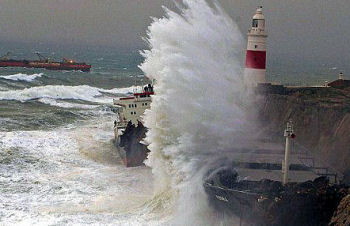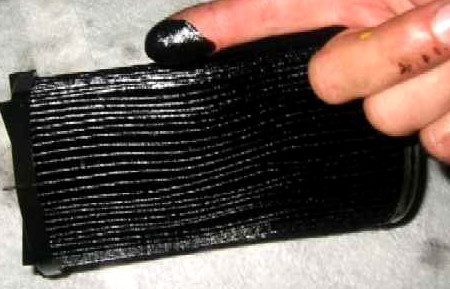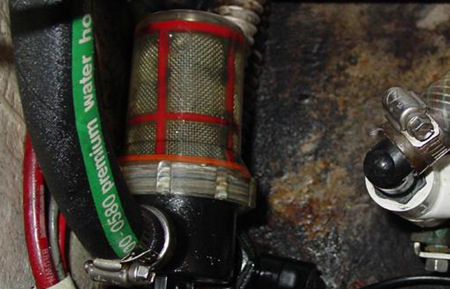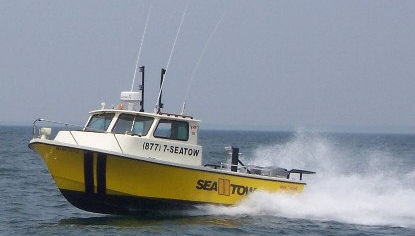How to Avoid Needing A Tow Service
Did your grandmother ever tell you "A stitch in time saves nine?" If so, what she meant was that with a little work in the beginning (like good boat maintenance and planning ahead) you could avoid a lot more trouble, work and expense later. But sometimes no matter how prepared you are, gremlins get to work in the engine room.

What to do when trouble strikes —
First, Don't Panic
Before you begin troubleshooting or get on a call for assistance, take stock of your situation and your location. In most cases, you will not be in imminent danger. Run through a checklist of things that will dictate how you should handle the situation and what you should do next.
- What are the sea conditions?
- Is your vessel likely to be swamped?
- How deep is the water you are in and is your anchor rode long enough to set an anchor?
- Are you in a shipping channel or upstream of a dam or waterfall?
- How many hours are left before nightfall?
- Are you in an area with heavy or light recreational boating traffic?
- Which way is the wind blowing and are you likely to be blown out to sea or onto a lee shore?
- How far from shore are you?
Now Make Your Plan
The answers to those questions will dictate what you should do next. It may be that you have time to do some troubleshooting before calling for assistance or setting your anchor.
If you are being taken out to sea, you will probably want to set your anchor if you have enough rode. If you are being blown onto a lee shore you should mentally pick the spot where you will want to set your anchor, keeping in mind that it might be hard to set and conditions close to shore will probably be rougher than they are farther out. Set in sooner rather than later.
If you are in a busy shipping channel, you should put out a PAN, PAN to alert the on-coming barge or ship traffic that you are in the channel and are disabled. Do not anchor in an active commercial channel. Then you should immediately call for assistance.
Make sure all aboard are now wearing their PFDs just in case something further goes wrong. While it is good to remember that problems on boats often have a "cascading" effect, that in itself is not a reason to panic.
Depending on your situation, no might be the time to call for assistance.

Basic Troubleshooting
Typically engines stop for one of four reasons:
- They are not getting fuel
- In the case of gasoline engines, they are not getting a spark
- The engine has been shut down automatically because of overheating or some other internal problem
- The engine's electronic black box has gone on the fritz or in the case of carbureted engines the fuel needle is clogged or the engine has "loaded up."
Boat engines won't run without fuel and running out of fuel is one of the biggest reasons engines "fail." Veteran boaters know to never trust their fuel meters that are historically one of the least reliable pieces of equipment on any boat, for reasons which we have never been able to understand. Prudent boaters always have an alternative method of checking fuel levels, which can be anything from poking a stick into the fuel tank to keeping mental track of how many hours the engine has been run and its fuel consumption at the rpm run.
If there is plenty of fuel in the tank, then you need to trace the path of the fuel from the tank to the engine. Check hose clamps and fittings. Check the fuel filter for water and clogging. Is your fuel pump working? Are fuel solenoids operating?

Electrical
If all looks well, move on to the electrical system. This system is not so easy to visually diagnose, but do what you can as you might find something obvious. Start with the battery, cable connections, spark plug wires and spark plugs. Look at your alternator or magneto, you just might be able to see something wrong.
If your engine stopped because it was overheating, you need to check your raw water intake for obstructions. Then check all hoses and hose connections. Is your engine water pump working? All boaters should know how to take off their water pump to check it. Do you have a spare impeller aboard?
If your engine has stopped operating because the electronics in the black box have been visited by gremlins, if you don't have a spare, you will need a tow.
And if by this time you have not been able to fix the problem, we would advise you to call for assistance. Even if your engine stops working early in the morning, with each passing hour nigh fall is getting closer. Remember, you are already in the grips of Murphy's Law. (If something can go wrong, it will go wrong.)
Is Assistance Available?
Before setting out on any boating trip, no matter how short or long, you should know if and where boating assistance is available from a recognized and professional towing service. Do not assume that there is a tow service near where you will be boating. Also, do not assume that assistance can be rendered immediately. It may take a tow vessel an hour or more to reach you.
Smart boaters will already have their membership in Sea Tow or Boat U.S., for example, before starting the season and they will also know where the towing services bases are in relation to their boating activities.
Had the people operating that 29' (8.8 m) powerboat in Rhode Island been a member of Sea Tow we doubt that they would have decided to jump in and swim for shore. And even if they did not have a working VHF, they could have flagged down a passing boat that could have made the call for assistance.
Stay with your vessel.
